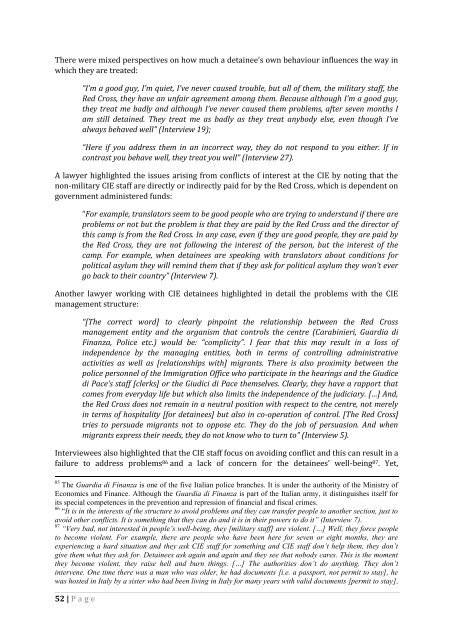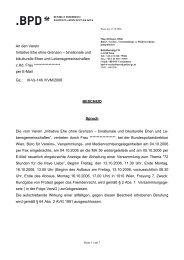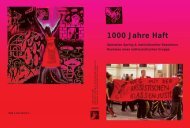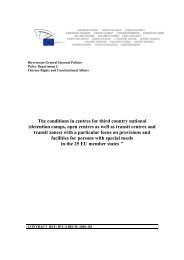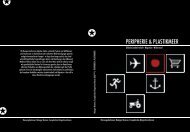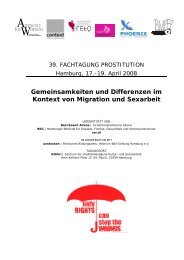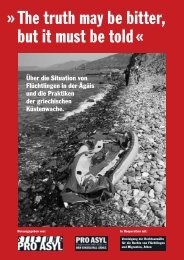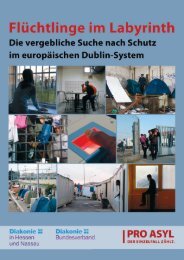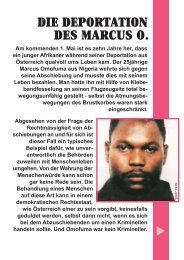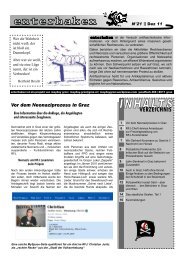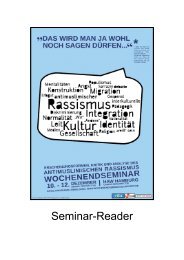Turin's CIE - International University College of Turin
Turin's CIE - International University College of Turin
Turin's CIE - International University College of Turin
You also want an ePaper? Increase the reach of your titles
YUMPU automatically turns print PDFs into web optimized ePapers that Google loves.
There were mixed perspectives on how much a detainee’s own behaviour influences the way in<br />
which they are treated:<br />
“I’m a good guy, I’m quiet, I’ve never caused trouble, but all <strong>of</strong> them, the military staff, the<br />
Red Cross, they have an unfair agreement among them. Because although I’m a good guy,<br />
they treat me badly and although I’ve never caused them problems, after seven months I<br />
am still detained. They treat me as badly as they treat anybody else, even though I’ve<br />
always behaved well” (Interview 19);<br />
“Here if you address them in an incorrect way, they do not respond to you either. If in<br />
contrast you behave well, they treat you well” (Interview 27).<br />
A lawyer highlighted the issues arising from conflicts <strong>of</strong> interest at the <strong>CIE</strong> by noting that the<br />
non-military <strong>CIE</strong> staff are directly or indirectly paid for by the Red Cross, which is dependent on<br />
government administered funds:<br />
“For example, translators seem to be good people who are trying to understand if there are<br />
problems or not but the problem is that they are paid by the Red Cross and the director <strong>of</strong><br />
this camp is from the Red Cross. In any case, even if they are good people, they are paid by<br />
the Red Cross, they are not following the interest <strong>of</strong> the person, but the interest <strong>of</strong> the<br />
camp. For example, when detainees are speaking with translators about conditions for<br />
political asylum they will remind them that if they ask for political asylum they won’t ever<br />
go back to their country” (Interview 7).<br />
Another lawyer working with <strong>CIE</strong> detainees highlighted in detail the problems with the <strong>CIE</strong><br />
management structure:<br />
“[The correct word] to clearly pinpoint the relationship between the Red Cross<br />
management entity and the organism that controls the centre (Carabinieri, Guardia di<br />
Finanza, Police etc.) would be: “complicity”. I fear that this may result in a loss <strong>of</strong><br />
independence by the managing entities, both in terms <strong>of</strong> controlling administrative<br />
activities as well as [relationships with] migrants. There is also proximity between the<br />
police personnel <strong>of</strong> the Immigration Office who participate in the hearings and the Giudice<br />
di Pace’s staff [clerks] or the Giudici di Pace themselves. Clearly, they have a rapport that<br />
comes from everyday life but which also limits the independence <strong>of</strong> the judiciary. […] And,<br />
the Red Cross does not remain in a neutral position with respect to the centre, not merely<br />
in terms <strong>of</strong> hospitality [for detainees] but also in co-operation <strong>of</strong> control. [The Red Cross]<br />
tries to persuade migrants not to oppose etc. They do the job <strong>of</strong> persuasion. And when<br />
migrants express their needs, they do not know who to turn to” (Interview 5).<br />
Interviewees also highlighted that the <strong>CIE</strong> staff focus on avoiding conflict and this can result in a<br />
failure to address problems 86 and a lack <strong>of</strong> concern for the detainees’ well-being 87 . Yet,<br />
85 The Guardia di Finanza is one <strong>of</strong> the five Italian police branches. It is under the authority <strong>of</strong> the Ministry <strong>of</strong><br />
Economics and Finance. Although the Guardia di Finanza is part <strong>of</strong> the Italian army, it distinguishes itself for<br />
its special competences in the prevention and repression <strong>of</strong> financial and fiscal crimes.<br />
86 “It is in the interests <strong>of</strong> the structure to avoid problems and they can transfer people to another section, just to<br />
avoid other conflicts. It is something that they can do and it is in their powers to do it” (Interview 7).<br />
87 “Very bad, not interested in people’s well-being, they [military staff] are violent. […] Well, they force people<br />
to become violent. For example, there are people who have been here for seven or eight months, they are<br />
experiencing a hard situation and they ask <strong>CIE</strong> staff for something and <strong>CIE</strong> staff don’t help them, they don’t<br />
give them what they ask for. Detainees ask again and again and they see that nobody cares. This is the moment<br />
they become violent, they raise hell and burn things. […] The authorities don’t do anything. They don’t<br />
intervene. One time there was a man who was older, he had documents [i.e. a passport, not permit to stay], he<br />
was hosted in Italy by a sister who had been living in Italy for many years with valid documents [permit to stay],<br />
52 | P a g e


